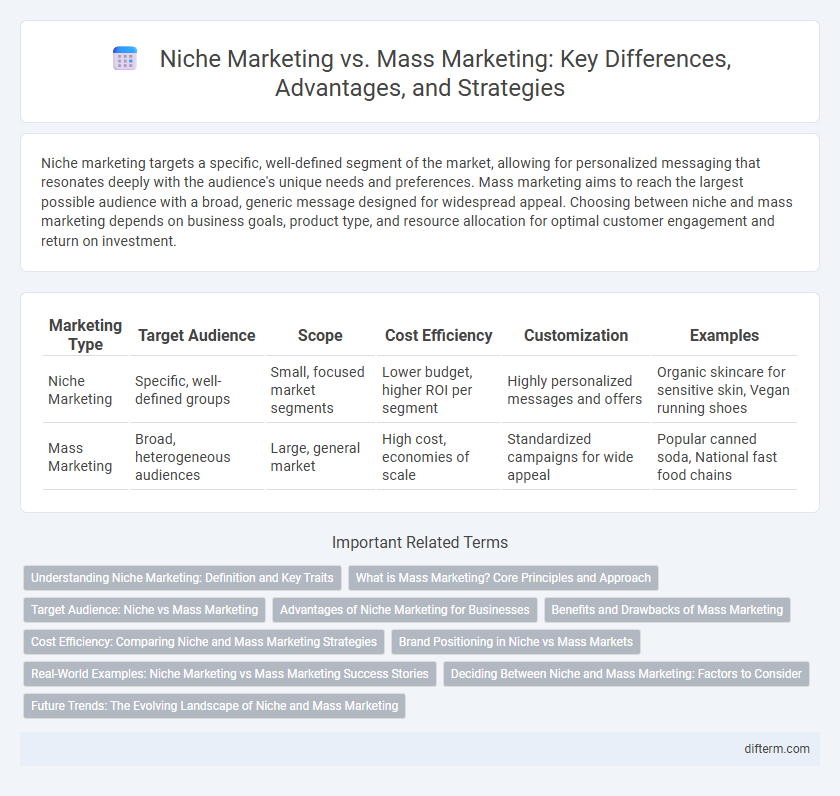Niche marketing targets a specific, well-defined segment of the market, allowing for personalized messaging that resonates deeply with the audience's unique needs and preferences. Mass marketing aims to reach the largest possible audience with a broad, generic message designed for widespread appeal. Choosing between niche and mass marketing depends on business goals, product type, and resource allocation for optimal customer engagement and return on investment.
Table of Comparison
| Marketing Type | Target Audience | Scope | Cost Efficiency | Customization | Examples |
|---|---|---|---|---|---|
| Niche Marketing | Specific, well-defined groups | Small, focused market segments | Lower budget, higher ROI per segment | Highly personalized messages and offers | Organic skincare for sensitive skin, Vegan running shoes |
| Mass Marketing | Broad, heterogeneous audiences | Large, general market | High cost, economies of scale | Standardized campaigns for wide appeal | Popular canned soda, National fast food chains |
Understanding Niche Marketing: Definition and Key Traits
Niche marketing targets a specific, well-defined segment of the market, emphasizing personalized messaging and tailored product offerings to meet unique customer needs. It typically involves deep customer research, specialized branding, and a focused marketing strategy that contrasts with the broad approach of mass marketing. Key traits include high customer loyalty, reduced competition, and the potential for premium pricing due to specialized value propositions.
What is Mass Marketing? Core Principles and Approach
Mass marketing targets a broad audience to maximize product reach and sales volume by focusing on universally appealing products and messages. Core principles include standardizing marketing efforts, emphasizing economies of scale, and delivering a consistent value proposition to a large market segment. This approach relies on high visibility channels such as television, radio, and digital platforms to create widespread brand awareness and drive consumer demand.
Target Audience: Niche vs Mass Marketing
Niche marketing targets a specific, well-defined segment of the market, allowing for personalized messaging that resonates deeply with a smaller audience, leading to higher engagement and loyalty. Mass marketing aims to reach the largest possible audience with a broad message, optimizing for scale and brand awareness but often sacrificing personalization. Understanding the target audience's distinct preferences and behaviors is crucial for selecting the right marketing strategy and driving effective campaign results.
Advantages of Niche Marketing for Businesses
Niche marketing allows businesses to target a specific, well-defined segment of consumers, resulting in higher customer loyalty and more effective use of marketing resources. By catering to specialized needs, companies can differentiate themselves from competitors and command premium pricing. This focused approach also enables more personalized product development and tailored messaging, increasing conversion rates and overall profitability.
Benefits and Drawbacks of Mass Marketing
Mass marketing targets a broad audience, maximizing brand exposure and achieving economies of scale, which can lead to lower costs per unit and increased overall sales volume. However, this approach often ignores specific consumer needs, resulting in less personalized messaging and potentially lower engagement rates. Additionally, mass marketing risks higher competition and market saturation, which can diminish brand differentiation and customer loyalty.
Cost Efficiency: Comparing Niche and Mass Marketing Strategies
Niche marketing delivers higher cost efficiency by targeting specific customer segments with tailored messages, reducing wasted ad spend and increasing conversion rates. Mass marketing incurs greater expenses due to broad media buys aimed at large, diverse audiences, often resulting in lower engagement and higher cost per acquisition. Businesses seeking optimized return on investment typically find niche marketing more cost-effective by concentrating resources on high-potential, well-defined markets.
Brand Positioning in Niche vs Mass Markets
Niche marketing enables precise brand positioning by targeting specific customer segments with tailored messaging, fostering stronger brand loyalty and higher perceived value. Mass marketing focuses on broad brand positioning to achieve widespread recognition and large-scale reach, often prioritizing brand awareness over personalization. Effective brand positioning in niche markets leverages unique value propositions, while mass market strategies emphasize uniform messaging and extensive distribution channels.
Real-World Examples: Niche Marketing vs Mass Marketing Success Stories
Niche marketing success stories include brands like Tesla, which targets environmentally conscious consumers with high-end electric vehicles, and Dollar Shave Club, which carved out a specialized market by offering affordable subscription-based razors. Mass marketing examples include Coca-Cola's global campaigns that focus on broad demographic appeal and Nike's extensive endorsements aiming at diverse sports enthusiasts worldwide. These real-world cases highlight how niche strategies excel in building loyal customer bases, while mass marketing drives widespread brand recognition and sales volume.
Deciding Between Niche and Mass Marketing: Factors to Consider
Choosing between niche marketing and mass marketing requires analyzing target audience specificity, budget constraints, and product uniqueness. Niche marketing offers higher engagement with tailored messaging for a specialized group, while mass marketing aims for broader reach and brand awareness across diverse demographics. Marketers should consider market size, competition intensity, and potential ROI to align strategy with business goals and customer needs.
Future Trends: The Evolving Landscape of Niche and Mass Marketing
The future of marketing emphasizes hyper-personalization driven by advanced AI algorithms that enable niche marketing to deliver highly targeted content and offers. Mass marketing strategies are evolving with automation and big data analytics to efficiently reach broad audiences while maintaining some degree of personalization. Emerging trends highlight a blended approach where marketers leverage niche precision within mass frameworks to maximize customer engagement and ROI.
Niche marketing vs mass marketing Infographic

 difterm.com
difterm.com